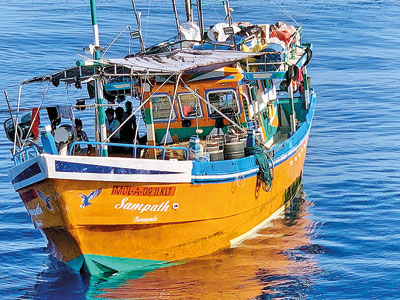News
Govt. to expand vessel monitoring as Lankan fishermen continue to fish in foreign waters
The multi-day fishing vessel Sampath 7 left the fisheries harbour in Beruwala in May last year, and its skipper Mahalingam Kanapathi steered the boat into the waters of Seychelles. However, since the vessel did not have a valid licence to fish in foreign waters Kanapathi was arrested along with his vessel by Seychelles coast guards on June 1.

Sampath vessel. Pic courtesy Seychelles People's Defence Forces
When such an incident occurs usually the vessel and fishing gear are confiscated and the fishermen are repatriated after the payment of a fine by the vessel owner. In 2020 two vessels “Sampath 5″ and “Dhammi” from the same fishing community were seized by Seychelles authorities and after court proceedings and fines of 44,600 USD (Rs.9 million) and 34,850 USD (Rs.7 million) respectively, the fishermen and the vessels were released.
In this instance Kanapathi had pleaded guilty for charges of illegal fishing, but the judge pointing out to the previous incident and noting that the fines hadn’t deterred the fisherman had imposed a mammoth fine of 1.7 million USD (almost 352 million rupees). Unable to settle this fine, the 32-year-old Kanapathi , the sole breadwinner of a family with 2 children is currently serving a jail term of two years in the Seychelles.
From historical times Sri Lankan fishermen engage in what is known as ‘island job’ or ‘dupath rassawa’ in Sinhala–entering islands with shallow waters for fishing purposes. However, after countries adopted The Law of the Sea Convention in 1982, it is deemed illegal to enter foreign waters without a permit. Waters around Diego Garcia (British Indian Ocean territory), Seychelles, Mauritius, the Maldives, and Bangladesh are territories that
Sri Lankan fishermen
dare to sail into for fishing purposes.
Meanwhile, the continuing practice of what is termed Illegal, Unreported, and Unregulated (IUU) fishing in foreign waters, undermines global effort to conserve fish populations through managing fish stocks sustainably. This illegal method accounts for as much as 20% of the global fisheries catch. The European Union in 2014 cited IUU fishing practices as the key reason for imposing a fishing import ban on Sri Lanka that crippled its seafood industry and many livelihoods. The ban was lifted in 2016 after the government-initiated steps to curbing IUU fishing.
The introduction of a Vessel Monitoring System (VMS) on multi-day boats that go into high seas beyond Sri Lanka’s Exclusive Economic Zone was the main manner in which IUU fisheries was curbed.
Sri Lanka has about 4,200 multi-day fishing boats. The high seas fishing fleet is around 1,500 and all of these are fitted with VMS equipment, so that the vessels can be tracked. These high sea vessels have licences to fish in international waters.
It is believed that some Sri Lankan vessels, to circumvent the ban on IUU in Sri Lankan waters, go beyond Sri Lanka’s EEZ and engage in IUU fishing in international waters, said Kalyani Hewapathirana, Director of fishing operations of
the Fisheries Department (DFAR).
To address the IUU issue, the Government with the aid of the Australian government is taking steps to introduce the VMS to all the other multi-day boats as well, she said. Their licences will be suspended if they are found breaching the law.
According to Fisheries Department data, 121 Sri Lankan fishing vessels were arrested in foreign waters in the past three years. Of these, 31 were in the Maldives, 19 in Diego Garcia, 10 in Seychelles, four in Bangladesh, and three in Myanmar.
Fifty four vessels were apprehended by Indian authorities but the incidents of illegal poaching by Indian fishermen in Sr Lankan waters and subsequent arrests far outnumber these.
The protected marine area in Diego Garcia is a rich fisheries habitat that Sri Lankan vessels often breach. Official data from Diego Garcia from 2010 to 2020 reveal an interesting fact that of the 120 vessels arrested 76% were from Sri Lanka. Most of these vessels were from the fishing harbour in Beruwala. The targetted fish were mainly sharks.
The best way to say that you found the home of your dreams is by finding it on Hitad.lk. We have listings for apartments for sale or rent in Sri Lanka, no matter what locale you're looking for! Whether you live in Colombo, Galle, Kandy, Matara, Jaffna and more - we've got them all!

